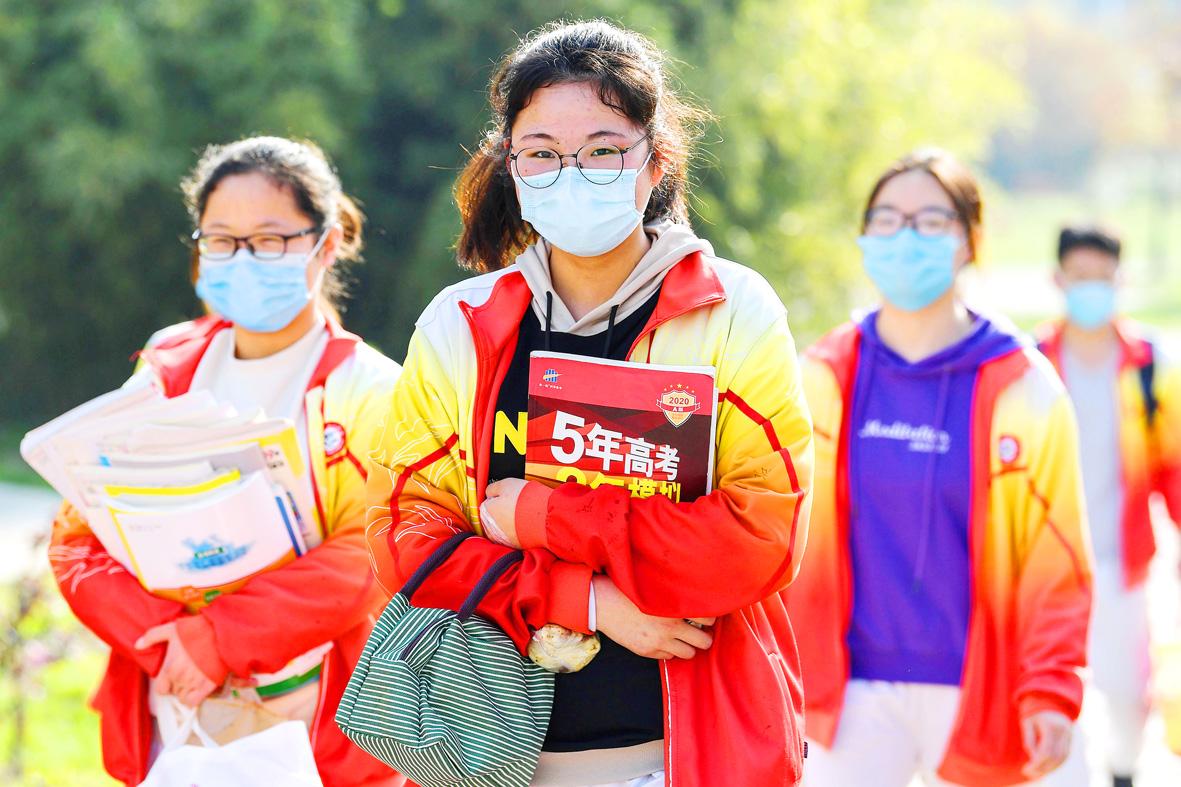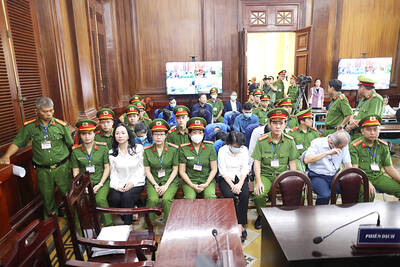China is facing a wave of COVID-19 infections from Russia, with more than half of the country’s total imported cases in the past two days coming through its northeastern land border.
Heilongjiang, China’s northernmost province, which borders Russia, has reported 60 imported cases this month, according to the Health Commission of Heilongjiang Province.
All but one entered the Chinese border by car or coach from the nearby Russian city of Vladivostok, after they flew from Moscow, where more than half of Russia’s 6,300 cases have been reported.

Photo: AFP
The Russian cases account for one-third of all the confirmed infections China has detected in people traveling from other countries this month.
Imported infections have become a major threat to rekindling the virus in China after draconian measures managed to reduce local infections to a crawl.
The jump in cases from Russia shows the challenge China faces in policing its land borders after aggressively reducing international flights to stem the flow of virus-carrying travelers.
China shares an extensive land border with Russia along its northeastern provinces such as Heilongjiang. Bustling trade and commerce connections between the people living in either border region keep cross-border traffic high during normal times. Now, with Russia shutting down international flights, the border has become one of the few entry ways for Chinese living in Russia to come home.
All the 59 people that crossed the border in Heilongjiang this month are Chinese, a telling sign that the country’s diaspora are increasingly seeking refuge back in China as the virus epicenter has shifted to other places in Europe and the US.
Russia had been playing down the severity of the outbreak in the country. It has recorded 47 deaths so far, relatively low compared with other nations in Europe and the US.
However, Russia’s cases have spiked in the past few days, with 954 new infections reported on Monday, bringing its total to 6,343.
Beijing has urged overseas Chinese to stay where they are, for fear of stoking a new wave of infections at home. It has only sent chartered flights to evacuate citizens — mostly students who studied overseas — from virus hotspots such as Italy, Iran and the UK.
China last month reduced the number of flights operated by each foreign airline to only one per week.
Chinese Premier Li Keqiang (李克強) has also pledged to bolster transportation control along border areas.

Republican US lawmakers on Friday criticized US President Joe Biden’s administration after sanctioned Chinese telecoms equipment giant Huawei unveiled a laptop this week powered by an Intel artificial intelligence (AI) chip. The US placed Huawei on a trade restriction list in 2019 for contravening Iran sanctions, part of a broader effort to hobble Beijing’s technological advances. Placement on the list means the company’s suppliers have to seek a special, difficult-to-obtain license before shipping to it. One such license, issued by then-US president Donald Trump’s administration, has allowed Intel to ship central processors to Huawei for use in laptops since 2020. China hardliners

A top Vietnamese property tycoon was on Thursday sentenced to death in one of the biggest corruption cases in history, with an estimated US$27 billion in damages. A panel of three hand-picked jurors and two judges rejected all defense arguments by Truong My Lan, chair of major developer Van Thinh Phat, who was found guilty of swindling cash from Saigon Commercial Bank (SCB) over a decade. “The defendant’s actions ... eroded people’s trust in the leadership of the [Communist] Party and state,” read the verdict at the trial in Ho Chi Minh City. After the five-week trial, 85 others were also sentenced on

Conjoined twins Lori and George Schappell, who pursued separate careers, interests and relationships during lives that defied medical expectations, died this month in Pennsylvania, funeral home officials said. They were 62. The twins, listed by Guinness World Records as the oldest living conjoined twins, died on April 7 at the Hospital of the University of Pennsylvania, obituaries posted by Leibensperger Funeral Homes of Hamburg said. The cause of death was not detailed. “When we were born, the doctors didn’t think we’d make 30, but we proved them wrong,” Lori said in an interview when they turned 50, the Philadelphia Inquirer reported. The

RAMPAGE: A Palestinian man was left dead after dozens of Israeli settlers searching for a missing 14-year-old boy stormed a village in the Israeli-occupied West Bank US President Joe Biden on Friday said he expected Iran to attack Israel “sooner, rather than later” and warned Tehran not to proceed. Asked by reporters about his message to Iran, Biden simply said: “Don’t,” underscoring Washington’s commitment to defend Israel. “We are devoted to the defense of Israel. We will support Israel. We will help defend Israel and Iran will not succeed,” he said. Biden said he would not divulge secure information, but said his expectation was that an attack could come “sooner, rather than later.” Israel braced on Friday for an attack by Iran or its proxies as warnings grew of